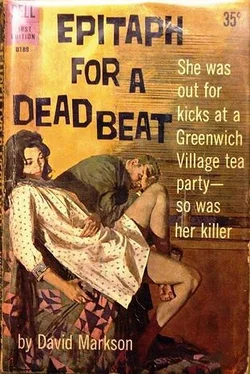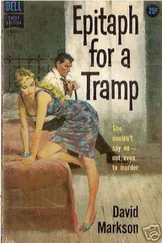The knife which killed Audrey Grant had been handled with cloth, and there was nothing which could establish Fern’s presence in the death room. The same was true at Grants. A check of the Hudson River near his apartment was already underway in an attempt to turn up the third murder weapon— a.38—and sewers in his neighborhood were being dredged also.
I learned most of this before ten o’clock, by which time the amphetamine and lack of sleep had me flighty. Vasella brought in an M.E. to look me over and the man decided I had a fracture of one rib, the obvious contusions but no damaged bones in my face, and only a lingering trace of my concussion. He taped me up and Vasella told me to get some rest.
Dana was still drugged. She tossed for half a minute when I woke her, then did a double take about the unfamiliar bedroom. She closed her eyes again, turning away with a moan. “Oh, heavenly damn,” she said. “Dana, you done did it again.”
She did another confused shudder when she got a look at my face. “You didn’t done it either,” I told her. She stared at me while I gave her the shortest condensation which would make sense, sitting up with a blanket around her bruised shoulders. I asked her if she could think of anything which might help, but she could only shake her head.
“Boy, I guess I owe you some thanks for getting me out of there. Leave it to perceptive O’Dea to pick the right girl to run to in an emergency.”
“How are you feeling?”
She fingered one of the welts on her arm. “Delicate to the touch, hung over and still woozy from those pills — otherwise downright jovial.” She glanced toward her clothes, then smiled. “I suppose it would be sort of superfluous to ask you to leave the room while I get dressed, wouldn’t it?”
“Hell, there’s no need to scram — the couch is okay for me.”
“Oh, stop. You look like you fell under a tractor.”
I grinned. “I’ll tell you what. They strapped about sixty yards of adhesive around my middle — I’m as safe as Don McGruder, if you want to take a chance on moving over half a foot.”
She lifted an eyebrow impishly. “Like old folks — cohabitation for companionship alone?”
“At least give it some dignity. Like wounded tigers, sulking—”
The clock on the dresser said twelve when I woke up. I had the bed to myself, but I saw the red dress still draped over the chair. I was stiff as Nebuchadnezzar’s femur. My robe wasn’t behind the door so I limped out front in my shorts and found her wearing it, reading something in my big chair.
“You’re a good-looking girl,” I told her. “You were pretty drunk at that party.”
“I’m a shopworn Greenwich Village slut with acute dislocation of all functioning parts,” she said. “I’m twenty-six. I fell in love with a guy when I was nineteen, the way it only happens once — a beautiful goddam scatterbrained hunk of test pilot who got himself disintegrated over some salt flats exactly one year to the day after we were married. Sex was the first thing I tried, then dope. I haven t quite abandoned either, but I guess I prefer Scotch. Although it’s funny — I found where you cache the booze a good two hours ago, and I haven’t had a drop. Did Fern really kill them, Harry?”
“Yes.”
“I’ll make you some breakfast, or whatever you call it at midnight. Bacon and eggs?”
“Four eggs. We did sulk at that, didn’t we?”
“You kissed me once — on the ear. And then you started muttering. Oh, sure, I meant to ask you about that. You were insisting that somebody named Bowman had hit you in the head with a baseball. Do you often have delusions of grandeur— I mean mixing yourself up with Ducky Medwick?”
“For crying out loud, how would you know who—?”
Her eyes sparkled. “Older brothers. The louts used to beat it into me. Who do you want, the old St. Louis Gas House Gang? Durocher, Medwick, Dean, Rip Collins, Pepper Martin—”
“Marry me,” I said. “Or at least bring your fielder’s glove and move in for a month or two.”
“You might just get me to think about it, if you were looking at me instead of the telephone. Call them, for heaven’s sake.”
I got Vasella, and since I asked he told me he’d slept in the office. “We decided to bring her in,” he said. “About seven o’clock. She denies everything, of course. We checked Peters on that slip — he did tell her about the third killing.”
I swore. “She booked?”
“We’d need a good deal more than we have. It’s an odd one, all right — the girl couldn’t be more sure of herself. We allowed her a phone call after a couple of hours, but do you think she contacted a lawyer? She called her publisher. He’s been pacing halls here ever since, trying to make up his mind.”
“I don’t get you—”
“Evidently the book is in the process of being shipped all over the country to go on sale in a few days, with her name on the cover. They don’t know whether to back her or not. He’s anxious to hear things from you directly. Oh, yeah, just incidentally, our friend Ephraim Turk finally appeared — walked in on us twenty minutes ago. Considerate of him, we feel.”
I said I’d be down, then ate and got dressed. Dana had to tuck in my shirt. I told her I’d meant it about sticking around, especially if she didn’t want to spend time alone in the place she’d shared with Audrey. She said she’d stay the rest of the night.
I saw the publisher. He was five-feet-two at most, forty-five at least, shoulderless, pleatless, impeccable. He carried a severely rolled British umbrella, an alligator attaché case, a Burberry.
He was what all good little status-seekers get to be when they grow up.
“I just don t know,” he said. “I’m shocked at the implications. On top of which I was supposed to have dinner this evening with Papa and I had to cancel—”
“Huh?” I said.
“I had copies of the novel rushed to a number of critics by special messenger the moment we heard, along with samples of Lucien Vaulkings work for comparison, but no one seems to want to make an unequivocal judgment about authorship. Lionel and VanWyck and Cleanth have phoned saying they have to have more time, and I haven t yet heard from Edmund. Edmund is in Connecticut, of course—”
“Of course—”
“It’s like Shakespeare and Bacon, isn’t it? I wonder what Bennett would do in such a situation. Perhaps I’ll call him—”
He wandered away to call Bennett. He finally decided to call his lawyers also, three or four of them. A soft-spoken, darkly shaven young man named Dunn from the District Attorney’s office had been brought in, and I told the story again for his benefit. I was going to get it by heart, like Galia omnia divisa est. At 1:10 my friend Nate Brannigan appeared from Central Homicide, big and beefy and sinewed like an ox, assuming responsibility probably because no one else could verify my reliability. “What are we doing about long-range background,” he wanted to know. “Her relationship with this man Vaulking— how much did she see him after the divorce? Can we establish that he’d been writing?”
Floyd Toomey was handling that end of the investigation. He kept looking at me as if he hoped I might disappear into an open manhole. “We’ve dug up four neighbors from when they lived together, captain,” he said. “Two of them claim he worked a lot, all the time.”
“Would seem to indicate there should have been a script,” Brannigan said.
“The other two say he never worked at all,” Toomey went on stonily. “Old ladies. Both of them swear he kissed his wife good-by when she went to work in the morning, then used to crawl back into the sack. Had female visitors three or four times a week. They’re both sure Vaulking is roasting in hell — Tin quoting here — while his wife suffered and was a dear.”
Читать дальше












